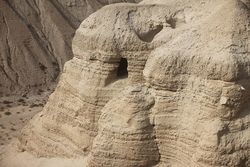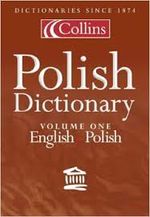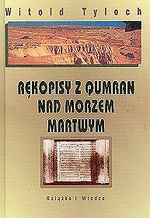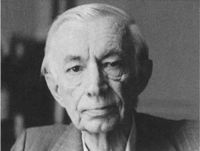Difference between revisions of "Category:Qumran Studies--Polish"
Jump to navigation
Jump to search
| (3 intermediate revisions by the same user not shown) | |||
| Line 1: | Line 1: | ||
[[File:Qumran caves.jpg|thumb|250px|[[Qumran Studies]]]] | |||
| | [[File:Polish dictionary.jpg|thumb|150px|[[Polish language]]]] | ||
The | The category: '''Qumran Studies--Polish''', includes (in chronological order) scholarly and fictional works in [[Polish language]] dealing with [[Qumran Studies]]. | ||
* [[ | * [[4 Enoch Main Page]] -- [[Languages]] | ||
== History of Research -- Notes == | |||
[[File:Rekopisy z Qumra Tyloch.jpg|thumb|150px|[[Witold Tyloch]]]] | |||
[[File:Milik.jpg|thumb|200px|[[Józef T. Milik]]]] | |||
[[File:Henryk Drawnel.jpg|thumb|150px|[[Henryk Drawnel]]]] | |||
Two | * Two Polish-born scholars were directly involved in the findings of the Dead Sea Scrolls, [[Eleazar Sukenik]] and [[Józef T. Milik]], but the discovery happened at a time in which Poland was under communist rule. International contacts were limited and studies in religion were discouraged. The situation began gradually to change only at the end of the 1950s. In 1958 the first book in Polish language on the Dead Sea Scrolls was published by NT scholar [[Henryk Strakowski]] and focused on the implications of the new discoveries for the study of Christian Origins. | ||
* [[ | * In 1960 NT scholar [[Eugeniusz Dabrowski]] also published a book on the Dead Sea Scrolls, once again focusing on the implications of the new discoveries for the study of Christian Origins. | ||
In | * In the 1960s [[Witold Tyloch]] published numerous articles in Polish on the Dead Sea Scrolls, including a report on the Berlin-Symposium [[Qumran-Probleme]], organized by Bardtke. At that symposium [[Witold Tyloch]] presented a paper in French. Tyloch also published in 1963 the first collection of Qumran texts in Polish translation, translated from the Hebrew. | ||
* [[ | * Two major international works on the Dead Sea Scrolls appeared in Polish language in the 1960s: the popular survey by American journalist [[Edmund Wilson]] in 1963 and the scholarly introduction by Polish-born specialist [[Józef T. Milik]] in 1968. | ||
* In Poland, in the 1970s, [[Witold Tyloch]] remained active as the major Polish specialist of the Dead Sea Scrolls. His interstes focused in particular on the social structure of the Qumran community. Beside Tyloch and Milik, two other Polish-born scholars, [[Shemaryahu Talmon]] and [[Ben Zion Wacholder]], were active internationally in those years but neither had his works published in Polish language. | |||
* [[Qumran Studies | * At the end of the 1980s, with the collapse of the Soviet rule, more Polish scholars joined the international study of the Dead Sea Scrolls. In 1987 [[Zdzislaw Jan Kapera]] organized at Mogilany near Cracow, Poland the first of a series of five biennial international Congresses of Qumran Studies. The second congress in 1989 was held "in memory of Jean Carmignac." | ||
Kapera was very active in the 1990s. Three more international Congresses were organized at Mogilany, in 1991, 1993, and 1995 respectively. At the Madrid Qumran Congress in 1991, Kapera presented a paper on "The Present State of Polish Qumranology" (published the following year in the Proceedings of the Conference). Kapera was not only the author of works on the Dead Sea Scrolls but also the editor of the journal [[The Qumran Chronicle]] (1990-) and founding director and owner of the Publishing House, [[Enigma Press]] (1990-), where several works by international author such as Fitzmyer and Betz were translated into Polish. In 1994, to mark the 45th anniversary of the Qumran Scrolls discoveries, Polish biblical scholars held a symposium in Czestochowa. Two new collections of Dead Sea Scrolls appeared in Polish language, by [[Piotr Muchowski]] in 1996 and [[Stanislaw Medala]] in 1997. | * Kapera was very active in the 1990s. Three more international Congresses were organized at Mogilany, in 1991, 1993, and 1995 respectively. At the Madrid Qumran Congress in 1991, Kapera presented a paper on "The Present State of Polish Qumranology" (published the following year in the Proceedings of the Conference). Kapera was not only the author of works on the Dead Sea Scrolls but also the editor of the journal [[The Qumran Chronicle]] (1990-) and founding director and owner of the Publishing House, [[Enigma Press]] (1990-), where several works by international author such as Fitzmyer and Betz were translated into Polish. In 1994, to mark the 45th anniversary of the Qumran Scrolls discoveries, Polish biblical scholars held a symposium in Czestochowa. Two new collections of Dead Sea Scrolls appeared in Polish language, by [[Piotr Muchowski]] in 1996 and [[Stanislaw Medala]] in 1997. | ||
* [[Qumran | * By the 2000s a new generation of Polish Qumran Scholars had emerged. [[Piotr Muchowski]] authored new books and commentaries on the Qumran Scrolls. [[Henryk Drawnel]] published mostly in English but also edited (with [[Andrzej Piwowar]]) a volume in Polish in 2009 with contributions from Polish and International scholars at an international conference he organized in Lublin in 2007. | ||
====References==== | |||
* [[Ida Froelich]]. "Qumran Research in Eastern and Central Europe." (2012) | * [[Ida Froelich]]. "Qumran Research in Eastern and Central Europe." (2012) | ||
| Line 59: | Line 36: | ||
* [[Zdzislaw Jan Kapera]]. "The Present State of Polish Qumranology" (1992) | * [[Zdzislaw Jan Kapera]]. "The Present State of Polish Qumranology" (1992) | ||
====Conferences==== | |||
* ''Mogilany 1987''. 1st International Congress. | * ''Mogilany 1987''. 1st International Congress. | ||
| Line 80: | Line 52: | ||
* ''Qumran: pomiedzy Starym a Nowym Testamentem (Qumran: Between the Old and New Testaments)''. Conference on the 60th anniversary of the discoveries at Qumran, organized by the Institute of Biblical Studies at the Lublin Catholic University. Lublin, Poland; October 25-27, 2007. | * ''Qumran: pomiedzy Starym a Nowym Testamentem (Qumran: Between the Old and New Testaments)''. Conference on the 60th anniversary of the discoveries at Qumran, organized by the Institute of Biblical Studies at the Lublin Catholic University. Lublin, Poland; October 25-27, 2007. | ||
Latest revision as of 16:17, 20 December 2019
The category: Qumran Studies--Polish, includes (in chronological order) scholarly and fictional works in Polish language dealing with Qumran Studies.
History of Research -- Notes
- Two Polish-born scholars were directly involved in the findings of the Dead Sea Scrolls, Eleazar Sukenik and Józef T. Milik, but the discovery happened at a time in which Poland was under communist rule. International contacts were limited and studies in religion were discouraged. The situation began gradually to change only at the end of the 1950s. In 1958 the first book in Polish language on the Dead Sea Scrolls was published by NT scholar Henryk Strakowski and focused on the implications of the new discoveries for the study of Christian Origins.
- In 1960 NT scholar Eugeniusz Dabrowski also published a book on the Dead Sea Scrolls, once again focusing on the implications of the new discoveries for the study of Christian Origins.
- In the 1960s Witold Tyloch published numerous articles in Polish on the Dead Sea Scrolls, including a report on the Berlin-Symposium Qumran-Probleme, organized by Bardtke. At that symposium Witold Tyloch presented a paper in French. Tyloch also published in 1963 the first collection of Qumran texts in Polish translation, translated from the Hebrew.
- Two major international works on the Dead Sea Scrolls appeared in Polish language in the 1960s: the popular survey by American journalist Edmund Wilson in 1963 and the scholarly introduction by Polish-born specialist Józef T. Milik in 1968.
- In Poland, in the 1970s, Witold Tyloch remained active as the major Polish specialist of the Dead Sea Scrolls. His interstes focused in particular on the social structure of the Qumran community. Beside Tyloch and Milik, two other Polish-born scholars, Shemaryahu Talmon and Ben Zion Wacholder, were active internationally in those years but neither had his works published in Polish language.
- At the end of the 1980s, with the collapse of the Soviet rule, more Polish scholars joined the international study of the Dead Sea Scrolls. In 1987 Zdzislaw Jan Kapera organized at Mogilany near Cracow, Poland the first of a series of five biennial international Congresses of Qumran Studies. The second congress in 1989 was held "in memory of Jean Carmignac."
- Kapera was very active in the 1990s. Three more international Congresses were organized at Mogilany, in 1991, 1993, and 1995 respectively. At the Madrid Qumran Congress in 1991, Kapera presented a paper on "The Present State of Polish Qumranology" (published the following year in the Proceedings of the Conference). Kapera was not only the author of works on the Dead Sea Scrolls but also the editor of the journal The Qumran Chronicle (1990-) and founding director and owner of the Publishing House, Enigma Press (1990-), where several works by international author such as Fitzmyer and Betz were translated into Polish. In 1994, to mark the 45th anniversary of the Qumran Scrolls discoveries, Polish biblical scholars held a symposium in Czestochowa. Two new collections of Dead Sea Scrolls appeared in Polish language, by Piotr Muchowski in 1996 and Stanislaw Medala in 1997.
- By the 2000s a new generation of Polish Qumran Scholars had emerged. Piotr Muchowski authored new books and commentaries on the Qumran Scrolls. Henryk Drawnel published mostly in English but also edited (with Andrzej Piwowar) a volume in Polish in 2009 with contributions from Polish and International scholars at an international conference he organized in Lublin in 2007.
References
- Ida Froelich. "Qumran Research in Eastern and Central Europe." (2012)
- Stanislaw Medala. "A Review of Polish Research on Intertestamental Literature in the Last Ten Years (1986-1985." (1997)
- Zdzislaw Jan Kapera. "The Present State of Polish Qumranology" (1992)
Conferences
- Mogilany 1987. 1st International Congress.
- Mogilany 1989. 2nd International Congress.
- Mogilany 1991. 3rd International Congress.
- Mogilany 1993. 4th International Congress.
- "45 Years of Qumranology." 32nd Symposium of Polish Biblical Studies. Czestochowa, Poland; September 15-16, 1994.
- Mogilany 1995. 5th International Congress.
- Qumran: pomiedzy Starym a Nowym Testamentem (Qumran: Between the Old and New Testaments). Conference on the 60th anniversary of the discoveries at Qumran, organized by the Institute of Biblical Studies at the Lublin Catholic University. Lublin, Poland; October 25-27, 2007.
Pages in category "Qumran Studies--Polish"
The following 26 pages are in this category, out of 26 total.
1
- Manuskrypty z Qumran a chrzescijanstwo (Manuscripts from Qumran and Christianity / 1958 Strakowski), book
- Odkrycia w Qumran nad morzem martwym a Nowy Testament (The Discoveries at Qumran near the Dead Sea and the New Testament / 1960 Dabrowski), book
- Wykopaliska w Qumran a pochodzenie chrzescijanstwa (The Excavations at Qumran and the Origins of Christianity / 1961 Chylinski), book
- Rekopisy znad Morza Martwego = Рукописи Мертового моря (Dead Sea Scrolls / 1963 @1960 Amusin / Kunderewicz), book (Polish ed.)
- Rekopisy z Qumran nad Morzem Martwym (Dead Sea Scrolls / 1963 Tyloch), book
- Odkrycia nad Morzem Martwym = The Scrolls from the Dead Sea (1963 @1955 Wilson / Swiecka), non-fiction (Polish ed.)
- Dziesiec lat odkryc na pustyni judzkiej = Dix ans de découvertes dans le Désert de Juda (Ten Years of Discoveries in the Wilderness of Judaea / 1968 @1957 Milik / Kubiak), book (Polish ed.)
- Starotestamentowy kult ofiarniczy w liscie do hebrajczyków a w manuskryptach i dokumentach z Qumran (The Old Testament Sacrificial Cult in the Letter to the Hebrews and the Manuscripts and Documents from Qumran / 1970 Skwarczewski), book
- Aspekty spoleczne gminy z Qumran (Social Aspects of the Qumran Community / 1973 Tyloch), book
- Zwój Miedziany 3Q15 (Copper Scroll 3Q15 / 1993 Muchowski), book
- Jezus, Qumran i Watykan = Jesus, Qumran und der Vatikan (1994 @1993 Betz, Riesner / Kielbasinska, Kapera), book (Polish ed.)
- Rekopisy znad Morza Martwego (Dead Sea Scrolls / 1996 Muchowski), book
- Qumran: poemat symfoniczny (Qumran: A Symphonic Poem / 1996 Steinfeld), poetry
- Manuskrypty znad Morza Martwego = The Dead Sea Scrolls Today (1996 @1994 VanderKam / Gromacka), book (Polish ed.)
- Piesni ofiary szabatowej z Qumran i Masady (Songs of the Sabbath Sacrifice from Qumran and Masada / 1996 Zdun), book
- 101 pytan sobre o Qumran = Responses on 101 Questions on the Dead Sea Scrolls (1997 Fitzmyer / Kapera), book (Polish ed.)
- Rekopisy z Qumran nad Morzem Martwym (Dead Sea Scrolls / 1997 Medala, Tyloch), book
2
- Komentarze do rekopisów znad Morza Martwego (Commentaries to the Dead Sea Scrolls / 2000 Muchowski), book
- Rekopisy znad Morza Martwego, 2nd rev. ed. (Dead Sea Scrolls / 2000 Muchowski), book
- Hebrajski qumranski jako jezyk mówiony (Qumran Hebrew as a Spoken Language / 2001 Muchowski), book
- Peszery do Ksiegi Izajasza (Isaiah Pesher / 2004 Malecki), book
- Komentarze do rekopisów znad Morza Martwego, 2nd rev. ed. (Commentaries to the Dead Sea Scrolls / 2005 Muchowski), book
- Qumran (The Qumran Mystery / 2006 @1996 Abécassis / Melech), novel (Polish ed.)
- Idea swiatyni w pismach qumranskich (The Idea of the Temple in the Writings of Qumran / 2006 Skrzypczyk), book
- Qumran: pomiedzy Starym a Nowym Testamentem (Qumran: Between the Old and New Testaments / 2009 Drawnel, Piwowar), edited volume




